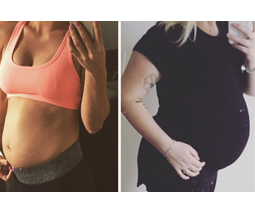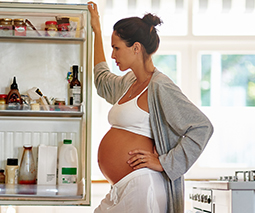11 questions all women have when pregnant for the first time

When you get that positive sign on the pregnancy test, a whole new world opens up, along with truckloads of questions. After all, why would you know anything about actually being pregnant? If you’ve been trying for a little while, you’re likely an expert on trying to get pregnant, but when it comes to knowing anything about the pregnancy journey, most of us are clueless.
1. When will my first scan be?
This will depend on whether you’re going public or private and who your healthcare provider is. Some women have an early scan, which usually occurs before 10 weeks; your doctor may refer you for one of these if you’ve had any bleeding in this pregnancy, or a previous miscarriage. If your GP doesn’t refer you, you can still arrange to have one of these, but it may incur a fee. After this one, most women attend a scan at 12 weeks, when you can meet your baby as well as have your baby checked for Down syndrome markers. You will also have an anomaly scan at 18-20 weeks, which involves a sonographer measuring your baby’s growth and development.
2. Is it okay to tell people?
This is completely up to you. Some couples like to keep their pregnancy news for themselves and perhaps close family, until they know for sure the pregnancy is progressing well. Usually, the 12 week scan offers real-deal confirmation of this, which is when many couples make their announcement. But you should consider what’s right for you. For example, having people know about your pregnancy early on means they can support you better with morning sickness and fatigue, and if a miscarriage occurs you will have people you can talk to.
3. What food should I avoid?
There is a range of food that pregnant women are advised against eating, because being pregnant makes your immune system weaker and less able to fight off bacteria that can cause gastro illnesses and nasty bugs. Some of these foods include: soft cheeses, deli meat and raw seafood. Other foods you need to eat ‘with caution’. See here for a full list.
4. How often do I need to see the doctor?
Once you discover you’re pregnant you should make an appointment to see your GP right away, who can refer you for maternity care. You will probably see a midwife for your first antenatal appointment between 10 and 16 weeks and you can expect between 8-10 hospital appointments with your midwife/obstetrician if your pregnancy is considered low-risk, normal and healthy.
5. When will my bump show?
Every woman is different, so there’s no one answer to this. However, consider that your uterus is the size of a pear during early pregnancy and grows to the size of a grapefruit by 12 weeks, which is when many woman start noticing their bump. Other factors affect when you start showing, such as your age, genetic make-up and size.
6. When can I hear the heartbeat?
As exciting as it is to hear your baby’s heartbeat for the first time, this may not happen until 10 to 14 weeks of pregnancy. Although your baby’s heart has been beating since 6 weeks gestation, due to its size it’s very hard to pick up with a Doppler (device used by health care providers to hear your baby’s heartbeat). For this reason, some care givers prefer to wait until you’re in your second trimester before using the Doppler during your check-ups.
7. When can I find out the sex of the baby?
You will probably need to wait until your 18-20 week scan to find out the gender of your baby, as it’s very hard for a sonographer to see your baby’s genitals clearly at an earlier scan.
8. Can I continue exercising?
If you feel physically well and have always exercised, you can continue to be active during your pregnancy. However, you should avoid exercise or sport that comes with a fall or collision risk, such as cycling, horse riding, football or tennis. Check with your GP if you’re unsure and if you’ve not previously been physically active but wish to exercise during this pregnancy. Consult with a personal trainer and your GP before commencing.
9. Is it okay to have sex?
Yes, go right ahead! If your pregnancy is normal and healthy, you can have sex right up until labour commences. However, if you have any complications such as vaginal bleeding, cervical weakness or a low-lying placenta, check with your midwife or doctor first.
10. Should I go to a birth class?
Antenatal classes are great for learning more about the birth process and preparing you for your experience. You also get the chance to ask lots of questions and meet other pregnant couples, who may become life-long friends. Some classes also include a tour of the delivery ward, which can help you and your partner prepare for your time there.
11. How will I know when I am going into labour?
Ensuring you attend all your antenatal appointments as well as a birth class will help you pinpoint when labour first starts for you, and this can be different for every woman. Some signs of early labour include: lower back pain, cramps, painful contractions, broken waters (a sudden gush of amniotic fluid between your legs) or a blood-tinged discharge, which could be your mucus plug. If you experience any of these signs, contact the delivery ward at your hospital right away for advice.








